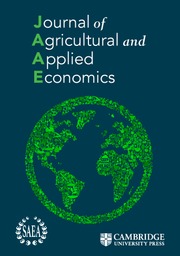No CrossRef data available.
Article contents
Relative Sensitivity of Selected Distributed Lag Estimators to Measurement and Specification Error
Published online by Cambridge University Press: 28 April 2015
Extract
The notion that one economic variable has an impact on another over several time periods is not uncommon to economic thought. Irving Fisher was the first to introduce empirically the notion of distributed lags using different shapes of probability curves. Alt continued the work, but made no a priori assumptions about the distribution of the lag as Fisher had done. Koyck and Nerlove returned to and extended the work of Fisher assuming a priori a monotonically declining distribution. More recently Jorgenson, Almon, and Johnson have developed estimators which, like those of Alt, assume only a continuous lag function of unspecified shape. There is evidence, however, that the Jorgenson and Johnson techniques are extremely sensitive to errors of measurement and specification because in applied work, reasonable estimates of lag distributions occur infrequently.
Information
- Type
- Research Article
- Information
- Copyright
- Copyright © Southern Agricultural Economics Association 1978

